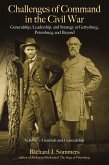Many historians of the Indian wars seem to credit the War Between the States as a significant factor in the uprising of numerous tribes during these same years. In fact, the continuous exposure to white civilization, the incursion by whites with modern technology, and an ambiguous government policy had caused frustration as far back as two decades before the Civil War began.
This account of some of the conflicts between American Indians and whites from 1861-1865 depicts the struggles among disenfranchised native peoples on the frontier and expansion of a predominantly white culture into the West. While whites fought whites from the Atlantic seaboard to the prairies of Kansas, great nations in Arizona, New Mexico, Utah, Montana, the Dakotas, Colorado, Nebraska, Kansas, Texas, Missouri, and Minnesota struck back at the incursion of white intruders.
The book neither condemns nor justifies the actions of either sideï¿¿rather, it is a thorough, chronological examination of the events and incidents that occurred during these four years. Based on confrontations as they were recorded by contemporary writers and historians, the book is not separated into individual accounts of the conflicts as many historians have previously done. Instead, Birdï¿¿s approach is to treat all the Indian wars fought between 1861 and 1865 in order of their occurrence to examine the governmentï¿¿s and the military's policies toward the "wild" American Indians of the West.
This account of some of the conflicts between American Indians and whites from 1861-1865 depicts the struggles among disenfranchised native peoples on the frontier and expansion of a predominantly white culture into the West. While whites fought whites from the Atlantic seaboard to the prairies of Kansas, great nations in Arizona, New Mexico, Utah, Montana, the Dakotas, Colorado, Nebraska, Kansas, Texas, Missouri, and Minnesota struck back at the incursion of white intruders.
The book neither condemns nor justifies the actions of either sideï¿¿rather, it is a thorough, chronological examination of the events and incidents that occurred during these four years. Based on confrontations as they were recorded by contemporary writers and historians, the book is not separated into individual accounts of the conflicts as many historians have previously done. Instead, Birdï¿¿s approach is to treat all the Indian wars fought between 1861 and 1865 in order of their occurrence to examine the governmentï¿¿s and the military's policies toward the "wild" American Indians of the West.









